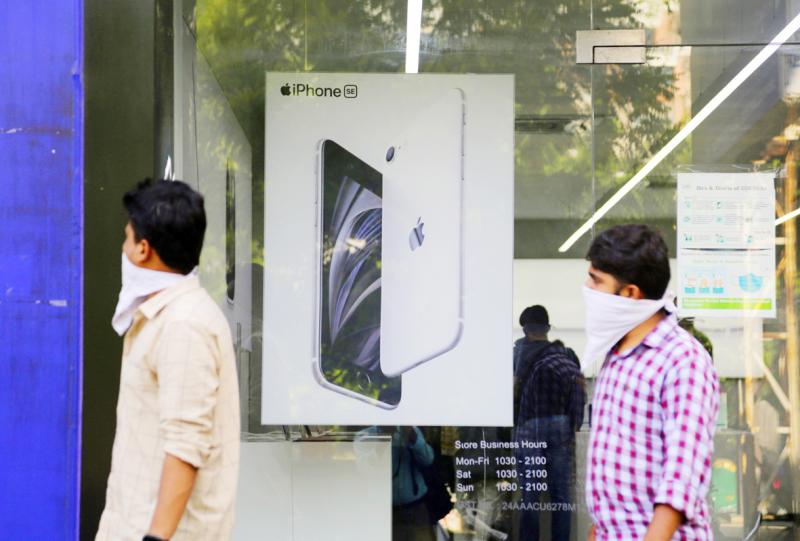An Apple Inc vendor is looking at shifting six production lines to India from China, which could result in US$5 billion of iPhone exports from the South Asian nation, the Times of India reported, citing people familiar with the matter who it did not identify.
The establishment of the facility would create about 55,000 jobs over about a year, the newspaper reported, not naming the Apple vendor.
It would also cater to the domestic market and expand operations to include tablets and laptops, the newspaper reported.

Photo: AP Photo/Ajit Solanki
Samsung Electronics Co and Apple’s assembly partners are among 22 companies that have pledged 110 billion rupees (US$1.47 billion) of investments to set up mobile phone manufacturing units in India.
Taiwan’s Foxconn Technology Group (富士康科技集團), Wistron Corp (緯創) and Pegatron Corp (和碩), all iPhone assemblers, are among companies picked to make smartphones under a production-linked incentive plan, Indian Minister of Electronics and Information Technology Ravi Shankar Prasad told a news conference in New Delhi on Saturday.
The move could boost the value of phone output to 11.5 trillion rupees in the next five years, he said.
The incentives are aimed at encouraging global companies to shift their manufacturing beyond China after a pandemic-induced trade dispute put the focus on risks to supply chains. The step is also part of Indian Prime Minister Narendra Modi’s calls for a self-reliant India aimed at boosting local manufacturing and reducing dependence on imports.
“The move is not against any country, but is India positive,” Prasad said.
The aim is for India to become a big global player in the electronics manufacturing segment, he said.
The plan is expected to generate 300,000 direct jobs and 900,000 indirect jobs in the next five years. Indian companies including Dixon Technologies and Optiemus Electronics have also applied to take advantage of the incentive program.
Companies that have submitted applications for component manufacturing include Ascent Circuits and Visicon, the government said in a statement.
As per the plan, the government is offering a financial incentive of as much as 6 percent on incremental sales of goods made in the country for five years.
It also promises that an incentive of 25 percent on capital expenditure would be provided for production of electronic components, semiconductors and other parts.

TRADE WAR: Tariffs should also apply to any goods that pass through the new Beijing-funded port in Chancay, Peru, an adviser to US president-elect Donald Trump said A veteran adviser to US president-elect Donald Trump is proposing that the 60 percent tariffs that Trump vowed to impose on Chinese goods also apply to goods from any country that pass through a new port that Beijing has built in Peru. The duties should apply to goods from China or countries in South America that pass through the new deep-water port Chancay, a town 60km north of Lima, said Mauricio Claver-Carone, an adviser to the Trump transition team who served as senior director for the western hemisphere on the White House National Security Council in his first administration. “Any product going

High above the sparkling surface of the Athens coastline, the cranes for building the 50-floor luxury tower centerpiece of Greece’s future “smart city” look out over the Saronic Gulf. At their feet, construction machinery stirs up dust. Its backers say the 8 billion euro (US$8.43 billion) project financed by private funds is a symbol of Greece’s renaissance after the years of financial stagnation that saw investors flee the country. However, critics see it more as a future “ghetto for the rich.” It is hard to imagine that 10km from the Acropolis, a new city “three times the size of Monaco”

STRUGGLING BUSINESS: South Korea’s biggest company and semiconductor manufacturer’s buyback fuels concerns that it could be missing out on the AI boom Samsung Electronics Co plans to buy back about 10 trillion won (US$7.2 billion) of its own stock over the next year, putting in motion one of the larger shareholder return programs in its history. South Korea’s biggest company would repurchase the stock in stages over the coming 12 months, it said in a regulatory filing on Friday. As a first step, it would buy back about 3 trillion won of paper starting today up until February next year, all of which it would cancel. The board would deliberate on how best to effect the remaining 7 trillion won of buybacks. The move

In a red box factory that stands out among the drab hills of the West Bank, Chat Cola’s employees race to quench Palestinians’ thirst for local products since the Gaza war erupted last year. With packaging reminiscent of Coca-Cola’s iconic red and white aluminum cans, Chat Cola has tapped into Palestinians’ desire to shun brands perceived as too supportive of Israel. “The demand for [Chat Cola] increased since the war began because of the boycott,” owner Fahed Arar said at the factory in the occupied West Bank town of Salfit. Julien, a restaurateur in the city of Ramallah further south,